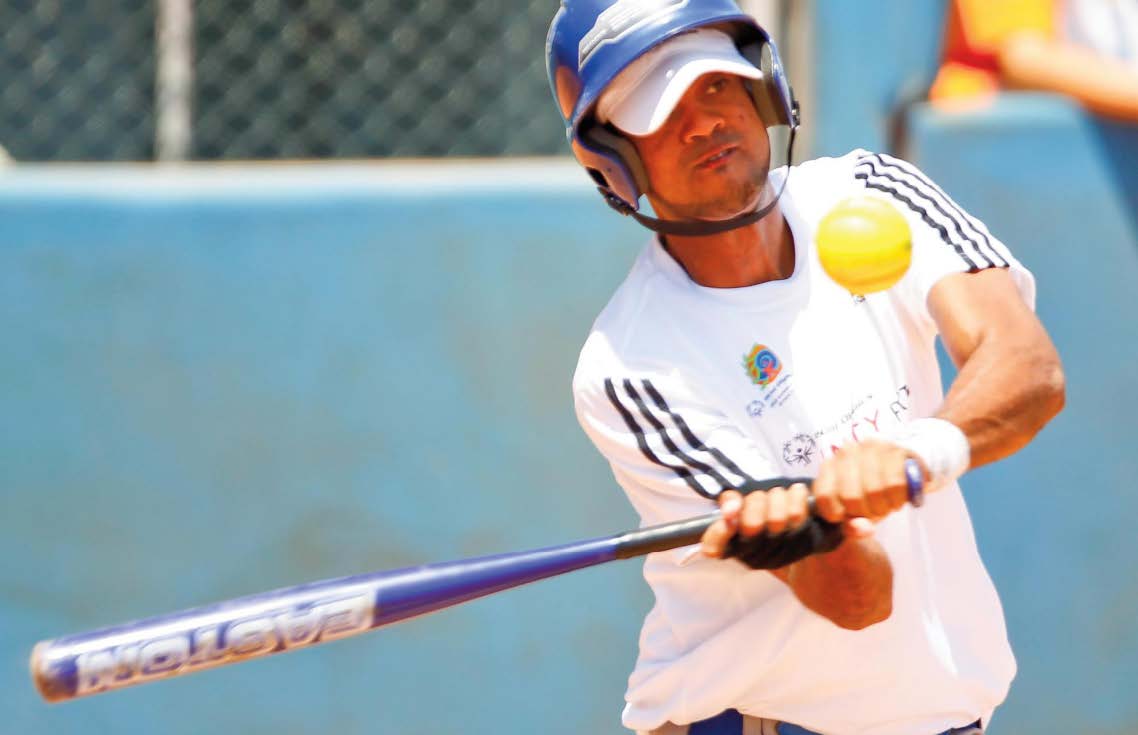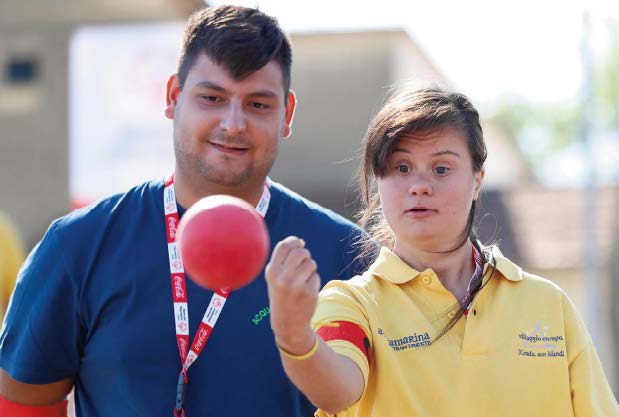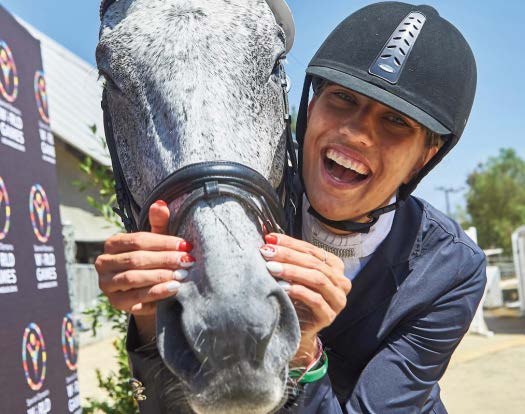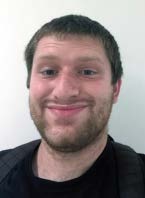TALENT MAKES PLAYS. TEAMWORK MAKES A STATEMENT.
People with intellectual disabilities are excluded and discriminated against every day. It's time we team up and take to the fifield to change this. Together, as one, intolerance and injustice don't stand a chance. Game On! Join the team at playunifified.org
FLORIDA SPECIAL OLYMPICS ATHLETES REFLECT ON THE PANDEMIC, CREATE NEW OPPORTUNITIES AND RETURN TO PLAY
BY AUSTIN PERT

PLAY BALL: Softball's return to play will occur in phase two, which allows for indirect contact. Only in phase three are contact activities allowed.
The coronavirus pandemic has been with society for over one year. This year has been the most consequential in memory. Special Olympics Florida athletes are among the most resilient individuals on earth, overcoming a variety of disabilities to compete at high levels in sports.
Far more than just competition opportunities went missing during COVID-19, but as the pandemic reaches its apparent eleventh hour, a return to play plan sparks optimism and eagerness. Social interaction as well as the structure provided throughout school and work have been missing from many athletes' lives for the past 14 months. Some have overcome the situation better than others. Florida athlete Daniel Fundora, who was diagnosed with autism in his youth, but has implored peers to "escape the label," has focused on helping others with their personal goals during this time.
To understand the impact COVID-19 has had on many Special Olympics Florida athletes, one must understand the positive impact Special Olympics has had on many lives. Fundora, a 32-year-old with a Special Olympics Florida gold medal in softball, struggled with traditional team sport environments in his adolescence, as he did socially. But upon finding Special Olympics at age 23, he was able to leap into not just the art of sports, but also the science of goal setting, personal achievement and identity.
He lost 65 pounds and continues to work to keep the weight off. He recalls leaving his job at a supermarket warehouse to focus on running a boot camp for children and adults with developmental disabilities. Helping others with some of the same challenges he has faced throughout his life is something that fulfills him. Fundora's journey to personal success has been one he's been able to take control of, but the past year has taken control out of the lives of so many athletes like him. The pandemic has cost millions of Americans opportunities that reach well beyond the realm of sports. Society has been asked to make painful sacrifices over the past year-plus. While they are a nuisance for anyone to have to follow, Special Olympics athletes have had to be extra flexible during this time.
Special Olympics Florida initiated a number of unique, digital outreach and at-home programs to help athletes get through the pandemic. They partnered with professional athletes in the "Fit 5 Like a Pro," program which featured well-known sports stars, including MLB's Dansby Swanson, the NFL's Cameron Brate, and professional tennis' Bob Bryan. These short, minute-long YouTube clips would encourage those in the Special Olympics community and beyond to practice healthy habits by "[exercising] five times per week, eat five fruits and vegetables daily, and drink five glasses of water a day," according to Special Olympics' YouTube playlist. Special Olympics Florida started a "Fit and Well" Facebook group during the pandemic. It has 1,700 members. And they also launched a home fitness regimen on YouTube during the spring and summer months of 2020.
Nobody knows this better than Hope Jacobson, who is Special Olympics Florida's biggest fan in Greater Miami. She has been involved with the organization since 1974. She has seen the nonprofit grow immensely over the years, from just 300 total athletes when she initially became involved to 8,000 athletes in Miami-Dade County alone. These athletes' ages range from early childhood to elderly – "you never age out of Special Olympics," Jacobson says. The pandemic disrupted the natural flow of practices and competition in every sport. Depending on the locality of each Special Olympics program, the return to play phase may be varied.


BACK TO BUSINESS: In South Florida, bocce and equestrian have returned fully to in-person training, as have cheerleading, tennis, track and field, cycling and soccer. Where competitions are allowed to take place, activities may be staggered to reduce physical contact both on the field of play as well as the general site of competition.
For example, in phase one, no direct or indirect contact can be initiated. What this means is that contact sports would be off-limits, and non-contact sports with shared equipment would be too. Bocce ball is one of the signature activities allowed under phase one, as it is non-contact, any equipment can either be sanitized frequently or simply not shared, and the sport is outdoors.
Phase two allows for indirect contact, which is described on Special Olympics' website as "an activity where a ball or equipment is touched or in contact with an individual's hands/skin, and then directly touching another individual's hands/skin without disinfection." Only in phase three are contact activities allowed. For example, according to Special Olympics, "Scrimmage, or full play of any sports such as basketball, football, volleyball, floor hockey, or soccer, etc. however, would be considered direct contact as bodies are regularly in contact with one another." In South Florida for example, the following sports have returned fully to in-person training: Equestrian, cheerleading, bocce, tennis, athletics (track and field), cycling and soccer.
In regions where area competitions are allowed to take place, activities may be staggered to reduce physical contact, both on the field of play as well as the general site of competition. For example, an event involving 200 competitors and other individuals may be split up so only 50 people at a time are present. Another method of reduced-risk competition may be for each time to compete at separate sites, and for trading Special Olympics officials to collect scores from each individual team. In South Florida, a regional bocce tournament was held April 10, and the state tennis championships are scheduled for May 7 at Orlando's USTA campus. A waiver must also be signed by each athlete, coach or volunteer before returning to practice or play.
The return to play process has been gradual. As far back as September 2020, "Coaches received extensive instruction on how to run practices consistent with COVID-19 safety protocols, and all participants were required to adhere to a COVID-19 Code of Conduct. For athletes who were not yet ready to return to in-person training, we continued to offer virtual options," said Special Olympics Florida official Linsey Smith in an email correspondence.
The return to play could not have come soon enough for many athletes. When athletes missed past events due to virus-related cancelations during the pandemic's height, it was a huge loss for so many deserving individuals. Fundora recalls the 2018 US Games in Seattle. He won a gold medal in stand-up paddle boarding and considers it to be his greatest achievement.
When athletics had to take a hiatus at the onset of COVID-19, it certainly turned many athletes' lives upside down. But beyond sports, the pandemic left unprecedented circumstances. Athletes in Special Olympics Florida come from a variety of backgrounds, from lives with more means, to very humble situations. Many Americans have lost employment during the pandemic. Many Special Olympics athletes also dealt with COVID-19's adverse, non-pharmaceutical restrictions. "Everything that the general population is suffering [from], the special [needs] population is suffering from," said Jacobson.
Systemic inequalities facing the special needs community have forced it to bear the brunt of public health measures. Different subsets of the Special Olympics population may handle the public health crisis inconsistently. "Some of them respond better than others, especially amongst our population of people with autism spectrum disorders, one of the characteristics of the person on the spectrum, if they're truly autistic… they may be withdrawn and reticent and do not initiate social interactions, so it may not bother them as much," said Jacobson.
"Athletes like myself and anybody else [felt] lost," says Fundora. "Everybody that has felt the joy of Special Olympics for so long and never want to leave or stop doing what they love, and suddenly, this pandemic took everything away from them. This pandemic has been punishing for everybody."
Fundora's personalized fitness programs for many Special Olympics Florida athletes were a focus for him in getting through this time. His classes are just one of roughly a dozen offered by athletes in Special Olympics Florida. It's an "ongoing process" according to Fundora, but it's been a great way for many athletes to stay in shape and stay occupied during the coronavirus shutdown. Jacobson mentions how athletes continue to be disturbed by the disruption to routine and normalcy. She mentions a man in his 80s; he is her bowling coach. The man lives with his 76-year-old girl friend whom he cannot marry so as to avoid complicating both of their social security benefits. He affectionately calls Jacobson his mom. Flattered, she tells him she can't be his mom, but she can be his sister.
To go bowling, the man made an over half-hour commute to the alley his team practiced and participated at. Jacobson worries that the elderly gentleman will have lost some of his ability to drive by the time normality fully resettles. Public transportation and government-sponsored special transport services have picked back up as well, but health and safety still remain important considerations for athletes utilizing those options.
Jacobson has met with a group of athletes over Zoom on Monday evenings to just touch base and provide some company. This group's age range spans from school-age, to young adult, to middle age. She describes a young adult male who suffers from a loss of identity due to the pandemic's consequences.
Many of her middle-aged and older athletes have elderly parents in assisted living or long-term care facilities. So, over the course of the pandemic and into its peak, they have not been able to see their mothers or fathers in these settings.
"He's frustrated, he's angry, he feels like he's lost; the pandemic has taken everything away from him. He is not able to do sports, he's not able to socialize, he doesn't have opportunities, he lost the job he had," said Jacobson. She says that this individual is higher functioning and salvaged the recent months by creating his own new opportunity in personal training, working with other disabled men and women in fitness. For many athletes finding their way and rediscovering a purpose throughout the pandemic, physical fitness is a common denominator.
Special Olympics Florida has also played a part in helping its members and their families secure basic needs. The organization has athletes across socioeconomic backgrounds. If there is anything that has served as a staple of thankfulness and stability in an era defined by anything but, it is a hot family meal at the end of a long day. With many families facing insecurities even in good times, Special Olympics did not hesitate to answer the call from Miami-Dade County's less fortunate.
Special Olympics Florida does not charge a dime to its members or families. They rely heavily on donations to fulfill its mission and give back to the community. "During the summer, we had received a grant of money from UPS. Special Olympics asked the coaches to identify a bunch of parents that we would give gift cards to, so they could shop," Jacobson said. The organization is still getting meals from some restaurants to deliver to needy households. Over 30 families in Greater South Florida received food assistance from the organization. One family living deep in western Miami-Dade – a single mother and six children – lived without air conditioning. In addition to sponsoring delivered meals to this home, Special Olympics installed a window HVAC unit for the house.
While the situation seems grim at first glance, there is a light at the end of the tunnel with vaccines and safe, broad societal reopenings. Athletes are eager to get outside and into activities at all, no matter how different they may look and feel for now. Jacobson mentions an athlete by the name of Eddie who has been especially persistent to return to playing bocce ball. "He wouldn't take no for an answer. It wasn't Eddie calling up and saying, Hey, Hope, can you do it [organize practice]? It was Eddie calling up and saying, Hope, we have bocce practice at 10 o'clock on Sunday morning, I need you to be there at 9 a.m. and bring all the bocce balls… you couldn't say no to that."
Jacobson also had to look out for herself during the pandemic. The days of packing 12 athletes into a van had to be at least temporarily put on the shelf. While better days may lie ahead, athletes without reliable transportation did feel the effects of fewer available carpooling options.
While there continue to be daily challenges to just living life successfully during this time, athletes like Fundora and Eddie are striving to just work on themselves. For all the adversity Fundora has faced throughout his childhood and adulthood, he ensures that others will get the same chance he has to improve themselves with physical fitness.
Getting through the past year has been something many people—with and without intellectual or physical disabilities—have struggled to accomplish. But going into a dreary 2020 and escaping into a sunshine-filled 2021 takes little more than optimism and a positive outlook.
Fundora is especially optimistic about the year ahead for athletics to return in a state better than ever. "They're going to prevail, they're going to fulfill, they're going to build confidence again," Fundora said about the athletes in 2021. "Just like there were winners before, there will be winners again, when the time comes." •
ABOUT THE AUTHOR:

Austin Pert is a senior at the University of Miami, studying journalism, public relations, and sport administration. His interest in the disability community stems from sports and wanting to promote an inclusive environment for all. He hopes to pursue a career in media or communications.